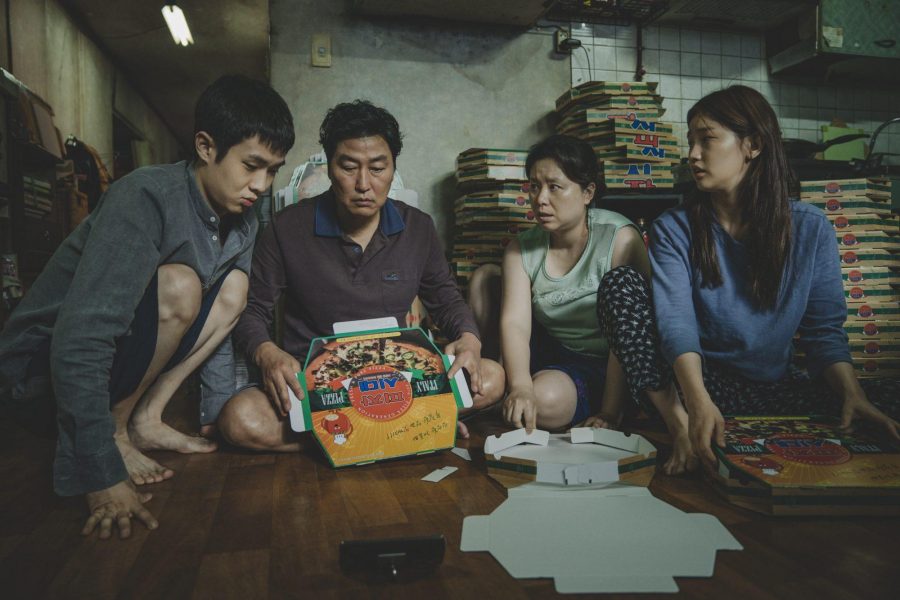Par•a•sit•ism
“One in which a parasite obtains benefits from a host, which it usually injures,” according to merriam-webster.com.
This is how the South Korean thriller, “Parasite,” reflects the the division within our society today — those who are poor harming the rich to financially support themselves.
Bringing light to the major issue of classism, the movie powerfully conveys the tragic, yet comical, narrative of a working class family’s attempt to cross the innate line between poverty and wealth.
The 131-minute film — released Oct. 11 in the United States and has since prompted some movie critics to suggest that it should be nominated for a best picture Oscar — begins in a cramped basement resided by Kim Ki-taek (Song Kang-ho, “The Drug King”), an incompetent, unemployed father and his family consisting of his wife and adult children, a daughter and son.
Their life takes a turn for the better when the son, Ki-woo (Choi Woo-shik, “Rosebud”), gets help from a friend to forge his credentials to be able to find work teaching English to the daughter of a wealthy family, the Parks. Soon enough, the Kims plot to have their entire family employed under the Parks’ family by deceiving them into hiring the daughter as an art therapist and into firing their current driver and housekeeper to naturally replace the jobs with the dad and mom, respectively.
However, the film takes a turn when the former housekeeper visits the mansion one rainy night and takes the Kim family and the audience down a rabbit hole, unveiling a huge secret that foils the Kims’ plan.
Although the storyline may suggest that this film is just another family movie, it has its lighter moments as well.
An example of this is when Ki-taek instructs Ki-woo to lift his phone higher in order to connect to the wifi of the house above theirs. This humorous scene has audiences scoffing at the cheap ways of the Kims’ but nevertheless addresses the unfortunate reality the poor undergoes.
Moreover, with the use of humor, the film keeps the audience laughing but gradually leaves viewers with a bitter feeling of hopelessness because audiences can relate to the protagonists’ immoral ways to escape poverty.
In a way, director Bong Joon-ho (“Okja”) wants audiences to consider how the parasitic nature of the Kim family pertains to their life as well. This film straightforwardly tells audiences that they too are parasites in real life by deeply portraying the deprivation the protagonists later fall into.
Accordingly, this is seen in the character development of the protagonists Ki-taek and Ki-woo, who start as optimistic people striving to integrate into the upper class society and end up loathing the upper class’ contemptuous treatment toward them.
Their respect for the Park family changes midway in the movie when the Parks mention how the Kims have a distinctive stench to them.
That odor becomes a motif, conveying how the rich and the poor are naturally different people, which enrages the characters as they confront the innate boundary between social classes.
In addition, the film uses its captivating cinematography to convey the huge economic disparity between the two families by visually showing the Kims’ returning to their basement from the Parks’ mansion through vast stairs.
Despite the rather foreign setting of South Korea, the movie proves to be relatable to all audiences because classism is an issue left unsolved globally.
All in all, with its powerful message and humorous plotline, Bong proves his ingenious directing as he successfully captures the aesthetic and comedic value. Note to the Academy: Get this man his first Oscar.










![Abigail Veyna (left), who plays Charlotte Lucas — a friend of the female lead — talks to senior Kathleen Handley, who plays one of the main characters, Elizabeth Bennet, during their fourth-period rehearsal of the stage version of Jane Austen’s classic novel, Pride and Prejudice on Friday, April 25, in the Performing Arts Center [PAC]. The two-hour-and-15-minute play consisting solely of theater students will debut tonight at 7 in the PAC.](https://shhsaccolade.com/wp-content/uploads/2025/05/IMG_3087-1200x800.jpg)




